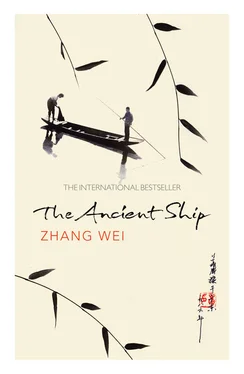The river flowed quietly between its narrow banks, its surface pale in color. The foundations of the old fortresslike mills were succumbing to the encroachment of vines. All but a few of them were quiet, but those that remained active emitted a rumble from morning till night. Thick moss overran the ground beyond the reach of ox hooves, and the elderly workers thumped the dark millstone eyes with wooden ladles, producing a hollow sound; the stones turned slowly, patiently rubbing time itself away. The city wall and the old riverbank mills stood peering at each other in silence.
Wali seemed to disappear from the memories of people in other places, and it was not until many years later that her existence was recalled; naturally, the first recollection was of the city wall. By then an earthshaking change had occurred in our land, characterized mainly by pervasive turmoil. The people were confident that it would take only a few years to overtake England and catch up to America. And that was when outsiders recalled the city wall and the bricks that topped it.
Early one morning crowds came to town, climbed the wall, and began removing the bricks. All Wali was in shock; agitated residents shouted their displeasure. But the people climbing the wall carried a red flag, which gave them implicit authority, so the residents quickly sent someone to get Fourth Master, a local man who, though only in his thirties, had earned distinction by being the eldest member of his generation in the Zhao clan. Unfortunately, he was then suffering from a bout of malaria and lacked the strength to climb off his kang . When the emissary reported the unwanted intrusion through the paper window of his room, Fourth Master’s weak response had the effect of a command: “Say no more. Find their leader and break his leg.”
So the townspeople snatched up their hoes and carrying poles and swarmed through the city gate. The demolition of the wall was at its peak, and the outsiders were surrounded before they knew what had happened. The beatings began. People who had been knocked to the ground got to their feet and shouted, “Be reasonable!” But all that got them was a defiant response from their angry attackers. “We’re not about to be reasonable when a gang of thieving bastards comes to town to tear down our ancestors’ wall!” More beatings ensued, for which the victims’ only protection was to cover their heads with tools they had brought with them. “A good fight!” was the call. Decades of grievances had found an outlet. “Take that!” The Wali residents hunched over and looked around with watchful eyes before jumping up and bringing their carrying poles down on the panic-stricken outsiders’ heads. Suddenly a painful shriek caused everyone to stop and turn to look. It was the group’s leader—his leg had been broken. A local man was standing beside him, his lips bloodless, his cheeks twitching, his hair standing on end. It was clear to the outsiders that the people of Wali were not bluffing, that their attack was for real. On that morning the residents of Wali were finally able to release a ferocity that had been bottled up for generations. The outsiders picked up their crippled leader and fled. The wall was saved, and though the decades that followed would be unrelentingly chaotic, they had lost only three and a half old bricks.
The wall stood proudly. No power on earth, it seemed, was strong enough to shake it, so long as the ground on which it stood did not move. The millstones kept turning, kept rumbling, patiently rubbing time itself away. The fortresslike mills were covered with ivy that also created a net atop the wall.
Many more years passed. Then one shocking day the ground did in fact move. It happened early in the morning. Tremors woke the residents from their sleep, followed by a dull, thunderous noise that, in seconds, reduced the town’s wall to rubble.
The townspeople were crushed, their hearts tied up in knots; as if on command, their thoughts roamed back to the time the old temple had burned down and the three-master had run aground in the river. Now their wall was gone, but this time the ground itself was the culprit.
As they sucked in breaths of cold air, they went looking for the cause. To their amazement, they realized that there had been omens of an impending earthquake, although, to their enduring sense of regret, no one had spotted them at the time: Someone had seen colorful snakes, more than he could count, crawl toward the riverbank; overnight a large pig had dug an astonishingly wide hole in its pen; hens had lined up atop the wall, cackling in unison before scurrying off together; and a hedgehog had sat in the middle of a courtyard coughing like an old man. But the people’s unease was caused by more than just these omens. Far greater worries and alarms had tormented them over the preceding six months. Yes, there were greater worries and alarms.
Rumors flew over the village like bats. Panicky townspeople were talking about the news that had just come: Land was to be redistributed and factories, including glass noodle factories, were to revert to private management. Time was turning once again, just like the millstones. No one dared believe the rumors. But before long the changes were reported in newspapers, and a town meeting was called, where it was announced that land, factories, and the noodle processing rooms would be turned over to private management. The town was in a daze. Silence reigned as an atmosphere like that which had existed when lightning struck the old temple had the town in its grip. No one, not adults and not children, spoke; looks were exchanged over evening meals, after which the people went to bed. Not even chickens, dogs, or waterfowl broke the silence. “Wali,” the people said, “you unlucky town, where can you go from here?”
The mayor and street monitors personally parceled out the land. “These are called responsibility plots,” they told the people. That left the factory and glass noodle rooms. Who would take responsibility for them? Not until many days had passed did anyone come forward to assume responsibility for the factory. Now only the processing rooms remained. The mills stood on the riverbank, wrapped in quiet, inauspicious mystery. Everyone knew that Wali’s essence—its misfortunes, its honor and its disgrace, its rise and fall—was concentrated in those dark, dilapidated old mills. Who had the courage to set foot in dank, moss-covered fortresses and take charge?
The people had long considered the milling of glass noodles to be a strange calling. The mills themselves and the places where the strands were extruded were suffused with complex, indescribable mystery. During the milling procedures, the temperature of the water, the yeast, the starch, the paste…if the smallest problem arose in any of the stages, the process would fail: Suddenly the starch would form a sediment; then the noodles would begin to break up…it was what the workers called “spoiled vats.” “The vat is spoiled!” they would shout. “The vat is spoiled!” When that happened, everyone would stand around feeling helpless.
Many expert noodle makers wound up jumping into the Luqing River. One was pulled out of the river and saved from drowning, only to hang himself in one of the mills the next day. That’s the sort of calling it was. Now who was going to step up and take charge? Since the Sui clan had operated the mills for generations, it made sense for one of them to assume responsibility. Eventually, Sui Baopu was urged to take over, but the forty-year-old red-faced scion shook his head; looking across the river at the line of mills, he muttered something under his breath, looking worried.
At that juncture, a member of the Zhao clan, Zhao Duoduo, shocked people by volunteering to take on the job.
All of Wali churned with excitement. The first thing Duoduo did after assuming responsibility was change the name of the enterprise to the Wali Glass Noodle Factory. People exchanged looks of incredulity as they realized that the industry no longer belonged to Wali, nor to the Sui clan. Now it belonged to the Zhao clan! Still, the old millstones rumbled from dawn to dusk. Where were they headed? People came to the riverbank to stand and gape at the mills, sensing that a bizarre change had occurred in front of their eyes, as extraordinary as hens lining up atop the wall or a hedgehog actually coughing. “Te world has turned upside down!” they said. So when the earth moved that early morning, they were terrified but not surprised.
Читать дальше












